Intro
The TSH blood test is a crucial diagnostic tool used to assess the functioning of the thyroid gland. Located in the neck, the thyroid gland plays a vital role in regulating various bodily functions, including metabolism, growth, and development. The TSH test measures the levels of thyroid-stimulating hormone (TSH) in the blood, which is produced by the pituitary gland to stimulate the thyroid gland to produce thyroid hormones. In this article, we will delve into the world of TSH blood test reports, exploring what they indicate, how to interpret the results, and what to expect during the testing process.
Understanding the TSH blood test is essential for individuals who have been experiencing symptoms of thyroid disorders, such as fatigue, weight gain or loss, and mood changes. The test is also used to monitor the effectiveness of treatment for thyroid conditions, ensuring that the thyroid gland is functioning within a normal range. With the help of this guide, readers will gain a deeper understanding of the TSH blood test report, enabling them to make informed decisions about their health.
The TSH blood test is a simple and relatively painless procedure that involves drawing a blood sample from a vein in the arm. The sample is then sent to a laboratory for analysis, where the levels of TSH are measured. The results of the test are typically available within a few days and are expressed in units of milliunits per liter (mU/L). The normal range for TSH levels varies depending on the laboratory and the individual's age, but generally falls between 0.4 and 4.5 mU/L.
TSH Blood Test Report Interpretation
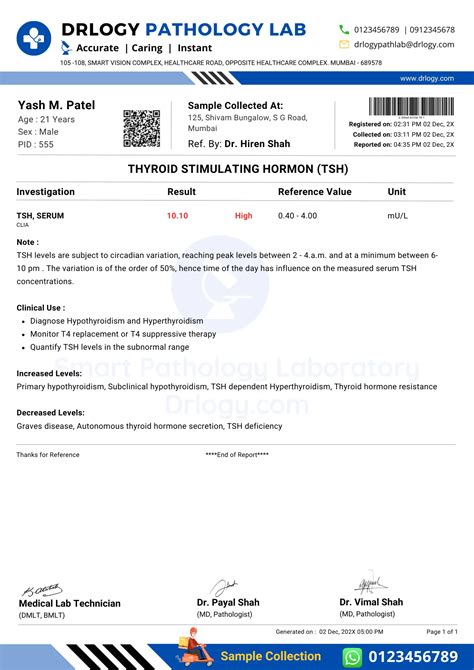
Interpreting the results of a TSH blood test report requires a basic understanding of the thyroid gland's functioning and the role of TSH. The report will typically include the following information: the TSH level, the reference range, and any additional test results, such as free thyroxine (FT4) and free triiodothyronine (FT3) levels. The TSH level is the most critical component of the report, as it indicates the functioning of the thyroid gland. A high TSH level may suggest hypothyroidism, a condition where the thyroid gland does not produce enough thyroid hormones. On the other hand, a low TSH level may indicate hyperthyroidism, a condition where the thyroid gland produces excessive amounts of thyroid hormones.
Understanding TSH Levels
The TSH level is measured in units of milliunits per liter (mU/L) and can be classified into several categories: * Normal: 0.4-4.5 mU/L * Elevated: 4.5-10 mU/L (may indicate hypothyroidism) * High: 10-20 mU/L (may indicate severe hypothyroidism) * Low: 0.1-0.4 mU/L (may indicate hyperthyroidism) * Very low: <0.1 mU/L (may indicate severe hyperthyroidism)TSH Blood Test Report Components
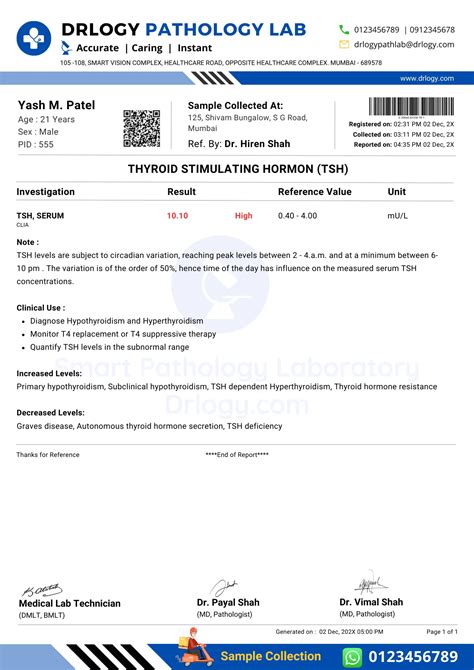
A comprehensive TSH blood test report will include several components, each providing valuable information about the thyroid gland's functioning. These components may include:
- TSH level: The primary indicator of thyroid gland functioning
- FT4 level: Measures the amount of free thyroxine in the blood
- FT3 level: Measures the amount of free triiodothyronine in the blood
- Thyroid antibodies: Measures the presence of antibodies that may indicate autoimmune thyroid disorders
- Thyroid-stimulating immunoglobulin (TSI): Measures the presence of antibodies that may stimulate the thyroid gland to produce excessive amounts of thyroid hormones
FT4 and FT3 Levels
The FT4 and FT3 levels are essential components of the TSH blood test report, as they provide additional information about the thyroid gland's functioning. The normal ranges for FT4 and FT3 levels vary depending on the laboratory and the individual's age, but generally fall between: * FT4: 0.8-1.8 ng/dL * FT3: 2.3-4.2 pg/mLTSH Blood Test Report Abnormalities
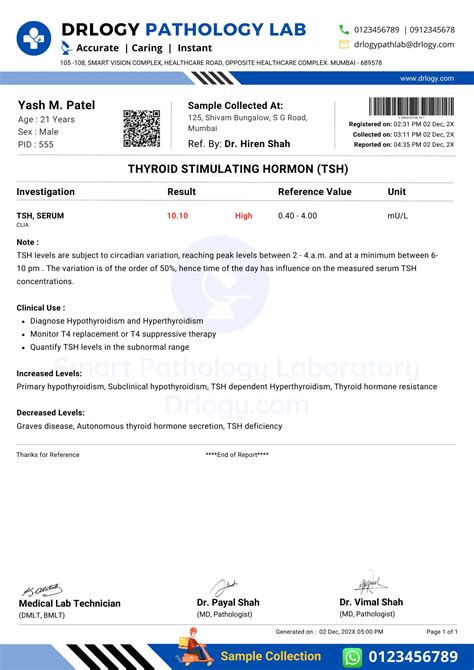
Abnormalities in the TSH blood test report may indicate a range of thyroid disorders, including hypothyroidism, hyperthyroidism, and thyroiditis. The following are some common abnormalities that may be detected in a TSH blood test report:
- Elevated TSH level: May indicate hypothyroidism
- Low TSH level: May indicate hyperthyroidism
- High FT4 and FT3 levels: May indicate hyperthyroidism
- Low FT4 and FT3 levels: May indicate hypothyroidism
- Presence of thyroid antibodies: May indicate autoimmune thyroid disorders
Thyroid Disorders
Thyroid disorders are common conditions that affect the thyroid gland's functioning. The following are some common thyroid disorders that may be detected in a TSH blood test report: * Hypothyroidism: A condition where the thyroid gland does not produce enough thyroid hormones * Hyperthyroidism: A condition where the thyroid gland produces excessive amounts of thyroid hormones * Thyroiditis: A condition where the thyroid gland becomes inflamed, leading to the production of excessive amounts of thyroid hormones * Hashimoto's thyroiditis: An autoimmune condition where the thyroid gland is attacked by the immune system, leading to hypothyroidism * Graves' disease: An autoimmune condition where the thyroid gland is stimulated to produce excessive amounts of thyroid hormones, leading to hyperthyroidismTSH Blood Test Report Monitoring
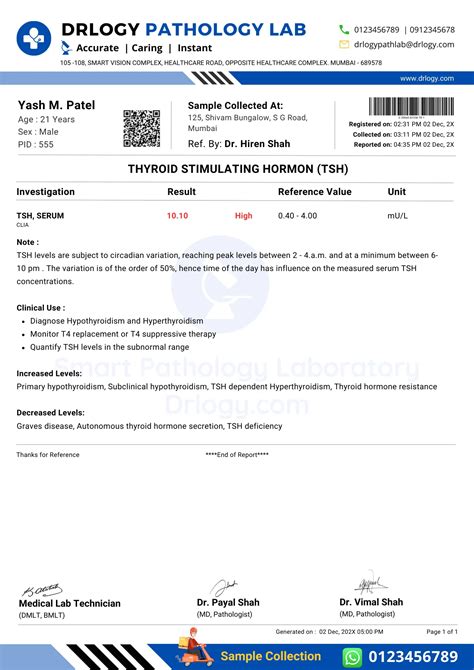
Monitoring the TSH blood test report is essential for individuals who have been diagnosed with thyroid disorders. The report provides valuable information about the effectiveness of treatment and the thyroid gland's functioning. The following are some common reasons for monitoring the TSH blood test report:
- To assess the effectiveness of treatment for thyroid disorders
- To monitor the thyroid gland's functioning over time
- To detect any abnormalities or changes in the thyroid gland's functioning
- To adjust treatment plans as needed
Treatment Options
Treatment options for thyroid disorders vary depending on the underlying condition and the individual's needs. The following are some common treatment options: * Medications: Such as levothyroxine (T4) and liothyronine (T3) to replace thyroid hormones * Radioactive iodine: To destroy part or all of the thyroid gland * Surgery: To remove part or all of the thyroid gland * Lifestyle changes: Such as dietary changes and stress management to support thyroid healthTSH Blood Test Report FAQs
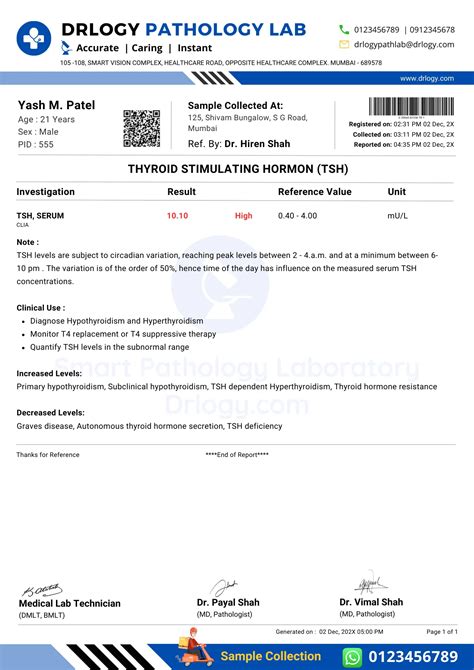
The following are some frequently asked questions about the TSH blood test report:
- What is the normal range for TSH levels?
- What does an elevated TSH level indicate?
- What does a low TSH level indicate?
- How often should I have my TSH levels checked?
- What are the risks and benefits of treatment for thyroid disorders?
What is the normal range for TSH levels?
+The normal range for TSH levels varies depending on the laboratory and the individual's age, but generally falls between 0.4 and 4.5 mU/L.
What does an elevated TSH level indicate?
+An elevated TSH level may indicate hypothyroidism, a condition where the thyroid gland does not produce enough thyroid hormones.
What does a low TSH level indicate?
+A low TSH level may indicate hyperthyroidism, a condition where the thyroid gland produces excessive amounts of thyroid hormones.
In conclusion, the TSH blood test report is a valuable diagnostic tool that provides essential information about the thyroid gland's functioning. By understanding the components of the report and how to interpret the results, individuals can make informed decisions about their health and work with their healthcare providers to develop effective treatment plans. We encourage readers to share their experiences and ask questions about the TSH blood test report in the comments section below. Additionally, we invite readers to share this article with others who may benefit from this information, and to explore other resources on our website for more information on thyroid health and wellness.
